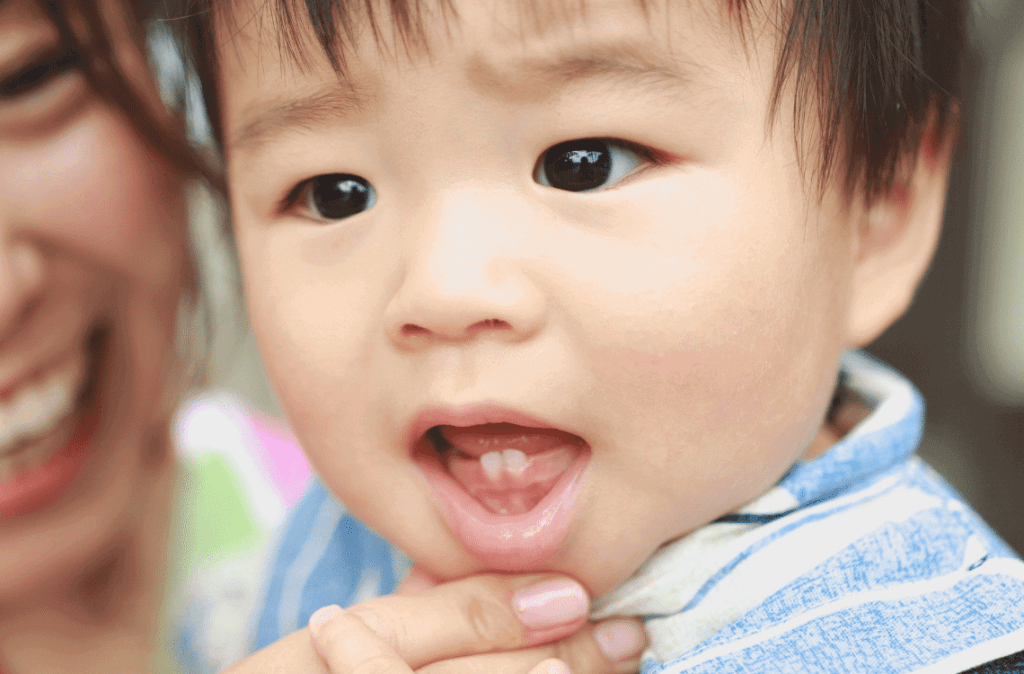While ticking off the developmental milestones, one of our concerns as parents for our growing baby is certainly about baby teething.
Thus, let’s discover when your baby is going to have his first tiny tooth poke through his gums. We would also cover on the order of the other baby teeth erupting at what age and the developmental order of his adult teeth, too.
Worry not; our teething charts will ease your way through comprehending your baby’s teething development!
Why Our Babies Need Their Baby Teeth
Though our baby will eventually lose his baby teeth, they are still essential for his developmental. Our baby needs his baby teeth to help him to bite, chew, speak and to strike a cute smile, too. More importantly, the baby teeth act as a placeholder for the permanent teeth. The baby teeth also aid in the development of our baby’s mouth and jaw muscles.
For your reference, the official term of when a new baby tooth appears is ‘eruption’. While our baby is going to have 20 baby teeth to bite on his food (and even toys) happily, it also makes us wonder when our baby will start to have their baby teeth.
When Do Baby Teeth Eruption and Loss Start
Your baby starts to gain his first tooth when he is around 6-month-old and it will continue until he is 3-years old. However, some babies only start teething when they are in their 12th and 13th month. Thus, it is hard to predict when your baby is going to have his first baby tooth.
Most babies have the bottom front teeth (also known as the lower central incisors) first and followed by the top front teeth (or the upper central incisors). It will then be followed by the canines and first molars. You might even notice that the baby teeth fill in often in pairs for both upper and lower jaws until all teeth have erupted.
Here’s a timeline of baby teeth eruption that you can refer to for when each tooth will come based on age range:
As shown above, the baby teeth falls out gradually between six to twelve years old starting from the incisors. In fact, they fall out in order of the eruption. After the baby teeth falls out, you will notice that there will be some small red spots of tissue.
Here are some takeaway tips for dental care during the teeth loss:
- Help your child to rinse his mouth with warm salt water, especially if there is blood.
- Avoid brushing the empty space too hard as it would make the growth of the new tooth more painful.
- Ensure your child brushes their teeth and flosses as usual.
On a side note, please do not panic if your child is having his adult teeth developing behind a baby tooth. It is common and you may consult a dentist when you realise both adult and baby teeth are of the same height. If the baby teeth does not fall out on its own, an extraction may be needed as well.
Related: find out more about why kids hate brushing their teeth and why you should help your baby brush their baby teeth.
How to Deal With Baby Teething
Once your baby starts teething, you will realise that your baby suffers from the tell tale signs:
- experiences drooling and swollen gums
- experiences sleep regression
- refuses food more frequently due to a loss of appetite
- cries more than usual to show fussiness
Worry not, you may offer the following safe teething aids and soon your baby will get used to the pain of baby teeth eruption.
What’s Next After Baby Teething and Eruption?
As the baby teeth erupt and shred, your child is going to develop his permanent or adult teeth. His first adult tooth comes in when he is around six to seven years old. The first molar teeth (two in each jaw) might come out behind the child’s baby teeth.
The other permanent teeth such as the incisors, canines and premolars will only come to fill in the gap when the baby teeth is lost.
Similarly to baby teeth, the timing for the adult teeth to come through might differ among children. Generally, the timeline for each type of adult tooth to erupt is as follows:
By the age of 21, your child will then have 32 permanent teeth, with 16 teeth in the upper jaw and another 16 in the lower jaw. However, some might not develop the third molars or more commonly known as wisdom teeth. They would then only have a set of 28 permanent teeth.
Baby Teething Go Hand-In-Hand With Dental Care
While it’s fascinating to see the first baby tooth, do not take the baby teeth lightly just because they are not permanent. Always follow the basic dental hygienic practices to prevent cavities and to keep your baby’s teeth healthy.
On top of this, you can schedule your baby’s first dentist appointment when his first tooth has erupted or when he is one year old.
For more interesting stories and fun recipes, stay tuned to Motherhood Story!
